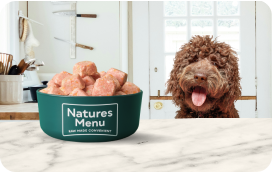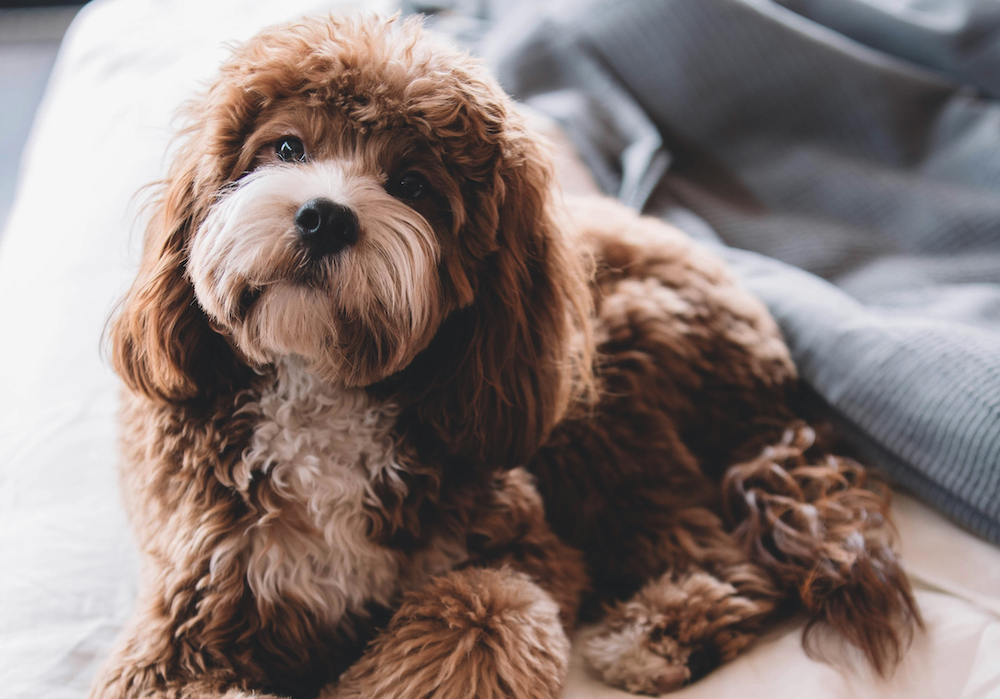Outline
Quick takeaways on dogs not eating
- Your dog might be experiencing appetite loss or an inability to eat due to medical or behavioural reasons.
- Speak to a vet if your dog hasn’t eaten their meals for 2 days.
- Trying alternative diets like raw might help your dog love mealtimes again.
If your dog has left some or all of their food, this doesn’t necessarily mean something is wrong. Your dog’s appetite can be as complex as ours, and dogs can go off their meals occasionally. They might have filled up on treats during the day, or they’re bored with their kibble or dry food.
However, if your dog goes 2 days without eating – or just 1 day if you have a puppy or dog with a medical condition – get in touch with your vet.
They can help to get to the bottom of things and identify whether your dog is experiencing appetite loss or an inability to eat.
Why is my dog not eating?
There might be a few reasons your dog is off their food. They might be in pain, feel anxious or stressed, have a dental issue or just not like the food you’re giving them – yes fussy dogs exist.
If your dog usually chows down happily but is suddenly off their food, this might be a sign that something’s wrong. And if you notice a change in your dog’s appetite – and there’s no clear explanation – it’s best to speak to a vet.
Here are some common reasons why your dog might not be eating:
1. Medical reasons
There are lots of medical conditions that could affect your dog’s appetite and ability to eat food, here are some of the key ones:
- Dental problems or pain – this could be caused by tooth decay, infections or a broken tooth. Or an unseen injury inside the mouth might be causing discomfort.
- General Pain – dogs are good at hiding their pain, but things like joint pain or back pain might be the reason they’re not into their food.
- Stomach or tummy troubles – this could be caused by viruses, infections, worms or a blockage in their gut. Sudden changes in diet can also cause stomach upset
- Organ problems – problems with their heart, lungs, liver or kidneys could all make your dog feel unwell and not want to eat.
- Illness – if your dog has a virus or infection, they might feel generally ill and off their food.
- Side effects of medication – some medicines like antibiotics or steroids can make your dog feel unwell or lose their appetite. Speak to your vet if you think this might be the case.
What to do: Check in with your vet. And in the meantime, try feeding your dog a bland diet of boiled chicken and rice.
If your dog is also vomiting regularly or has diarrhoea or a painful stomach when touched, call an emergency vet for advice.
2. Behavioural reasons
Dogs experience similar emotions and mental health issues as humans. Some of these issues could cause a decreased appetite:
- Stress
- Fear
- Anxiety or separation anxiety
- Boredom
- Cognitive decline in senior dogs
What to do: If you have an inkling that a behavioural issue might be the cause, speak to your vet, or reach out to a registered behaviourist who can help.
In the meantime, make sure your dog has a safe space to eat, and give them plenty of exercise and mentally stimulating toys.
3. Environmental changes
Changes at home can affect your dog’s wellbeing, causing stress or fear and affecting their appetite. Changes might include:
- Moving to a new home
- Adding a new pet to your home
- Having a new baby or child at home
- Having lots of visitors
- Rearranging furniture
What to do: Make introductions to new pets or children gradually, and make sure your dog always has a safe space to retreat to when they want time alone.
4. Problems with their food
If your dog has always eaten the same meal and is suddenly turning their nose up at it, check that the food isn’t mouldy or expired.
Some dogs are picky and prefer a certain flavour or type of food – refusing to eat any other kind. If you’re feeding a raw diet, try switching up your dog’s proteins or try a personalised meal plan that allows you to change up flavours and ingredients.
5. Age
You might notice a little decrease in appetite as your dog gets older – this is because senior dogs need slightly fewer calories than younger pups.
However, age isn’t a reason for your dog to stop eating altogether. Speak to your vet, they can recommend ways to support your dog from home like using a raised food bowl or trying softer foods they can more easily chew.
6. Overfeeding
If your dog isn’t eating their food but will eat treats, you might accidentally be overdoing the snacks. If you’re feeding lots of training treats or titbits during the day, your dog might not have room for dinner.
Stick to your dog’s daily calorie intake and make sure that treats and snacks make up no more than 10% of your dog’s daily intake.
How long can a dog go without food?
Most healthy adult dogs can go around 5 days without eating as long as they’re still drinking water. But, this doesn’t mean you should let 5 days go by before calling the vet!
If your dog hasn’t eaten their food for 2 days but is otherwise acting normal, speak to a vet. However, if your dog is diabetic and is skipping meals, contact your vet sooner.
If your puppy isn’t eating…
Young puppies need to eat more often than adult dogs. Skipping meals could risk them developing low blood sugar. Nursing puppies need to eat every 2-4 hours, and puppies closer to 2 months need to eat around 3 times per day.
Speak to your vet if your puppy is skipping meals. The biggest issue to rule out is parvovirus.
There’s no need to panic if they’ve had an upset tummy for a day or so, as this rare virus affects only 2% of puppies. However, if your puppy is skipping meals and vomiting or having diarrhea, speak to a vet as soon as possible.
What to do when your dog isn’t eating
The good news is there’s a lot you can do to help your dog find their appetite again.
1. Get a vet’s advice
Number one is checking in with a vet. If your dog is off their food, your vet will help to rule out any underlying medical conditions or behavioural issues and can put you in touch with other experts like dog behaviourists and nutritionists.
2. Help to make mealtime more appealing
Your dog might just need a little helping hand to enjoy their food again. You can use enrichment tools like slow feeder bowls, licking mats or Kongs to help make mealtime more stimulating.
If you’re feeding dry food, you could scatter the food on a wipeable floor indoors or outside in the garden to help encourage foraging behaviours.
You could also use some healthy food toppers to entice your dog to tuck in. And if you’ve recently switched your dog to raw and they’re turning their nose up at their dish, don’t worry.
It can take a little while for them to adjust, especially if you were feeding kibble before. Check out our expert tips for helping them enjoy their raw diet.
3. Try an alternative diet
Your dog might have become bored or gone off their current food. Lots of our customers found that their dogs had become disinterested in dry food but loved the texture and smell of raw food when they made the gradual introduction.
Unless your dog has a medical condition or allergies that require them to eat a certain diet, you can always explore other options like homemade, wet or raw diets. Or, you could try a different brand to see what they like.
You can also speak to a pet nutritionist for their advice.
4. Consider your dog’s emotional wellbeing
If you think stress, anxiety or boredom might be affecting your dog’s appetite, it’s a good idea to investigate the root of the problem. Make sure that your dog is getting enough regular exercise and mental stimulation – this might mean working with a dog walker or trainer if you’re stuck on time.
It’s important to create a calm environment during mealtime and allow your dog the space to eat and relax when they need to. A registered behaviourist might also be able to help you get to the bottom of things so that your dog can live a happier, healthier life.
When to speak to a vet
It’s worth talking to a vet if your dog hasn’t eaten for up to 2 days, especially if you’ve noticed a dip in their energy levels too.
You should always speak to a vet if your dog:
- Has a constant loss of appetite
- Has suddenly lost lots of weight
- Has regular vomiting or diarrhea
- Is showing behaviour that’s out of character
Dog not eating FAQs
Why is my dog not eating their food but will eat treats?
Your dog might genuinely dislike their current food or they might just be holding out for their favourite snacks or treats.
Also, if a dog is feeling unwell, they might not eat much but they may make an exception for a tasty treat. Try holding back the treats for a day or so to see whether their meal appetite improves.
If you think your dog is just being picky, there are plenty of ways to help manage a fussy eater.
Do dogs go through phases of not eating?
They shouldn’t do no. Some research has found that animals might eat a bit less during summer. They might experience a reduced appetite due to a medical condition or stress. Changes at home like a new baby might affect your dog’s appetite too.
Why won’t my dog eat their dry food?
Dogs can suddenly go right off their food if they have pain in their mouth or a problem with their teeth or gums. So, it’s worth getting this checked.
Similarly, if your dog is feeling poorly for any reason, they might prefer to eat canned, wet or raw food because the smell is more appealing or it’s easier for them to eat than dry.
You could try adding a little warm water or bone broth to their kibble. It might also be time to think about an alternative diet for your dog, like cooked or raw food. Speak to your vet if in doubt.
Why is my dog not eating raw food?
If your dog is new to raw, they might need a little time to adjust to the new texture and taste. But, even dogs who’ve been eating a raw food diet for a while can have short periods where they go off their meals.
It’s worth knowing what you can do to tempt them at dinner times – read our top 11 tips for helping your dog enjoy raw.
Why is my dog not eating their food but will eat human food?
If you feed your dog scraps from the table or snacks as you’re cooking, they might start to prefer your food to theirs! They might know that if they leave their dog food, they might be fed with human food or treats.
The easy solution here is to cut back on the extras and tempt them back to their own breakfast and dinners.
My dog isn’t eating but is acting normally, what should I do?
If your dog hasn’t eaten for 2 days, speak to a vet. They can offer advice on why your dog isn’t eating and help to identify a hidden health issue.
My senior dog isn’t eating, should I be worried?
Dogs might eat less as they get older, but the change in their appetite shouldn’t be drastic. You might want to speak to a vet a little sooner if your dog is on the older side – say if they haven’t eaten for 24 hours. They can help to find the cause and investigate further.
Why won’t my rescue dog eat?
If you’ve recently bought a new puppy or dog home, they might take a little while to adjust to their new life. They might feel too anxious or stressed to eat at first and this is normal.
Give them time to adapt to their new home and family, and their appetite should return in a day or so. Giving them the same or similar food to what they’re used to can help, and make sure they have somewhere quiet and calm to eat – without people, children or other pets interrupting them.
What should I give a sick dog that won’t eat?
If your dog is ill with an upset tummy or diarrhea, they might lose their appetite. For the first day or two, try giving them bland food like boiled chicken breast and cooked rice to help settle their stomach.
Speak to your vet if they’re still poorly after 2 days.
Try our personalised meal plans with high-quality raw ingredients to help keep your dog healthy and happy.








